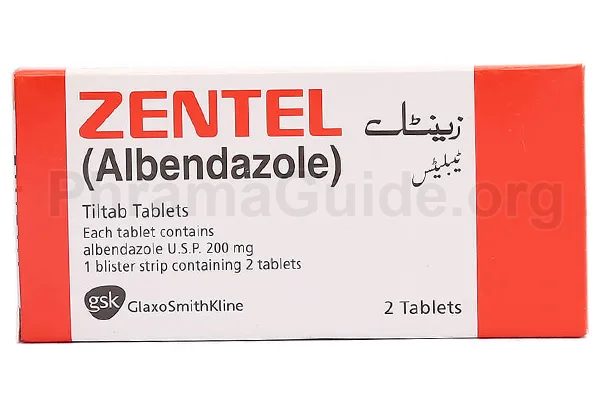Zentel is an anthelmintic (anti-parasitic) medication commonly used to treat infections caused by various parasites, such as tapeworms, roundworms, and flukes. Like any medication, Zentel can have side effects. It’s important to note that not everyone will experience these side effects, and some people may not experience any at all. Here are some common and less common side effects of Zentel may include:
Common Side Effects
- Nausea: Some individuals may experience nausea while taking Zentel. It is often recommended to take the medication with food to reduce the likelihood of nausea.
- Abdominal Pain: Abdominal discomfort or pain is a reported side effect while taking Zentel, although it is generally mild and temporary.
- Headache: Headaches are a common side effect associated with Zentel use.
- Dizziness: Some people may experience dizziness while taking the medication.
- Elevated Liver Enzymes: Zentel can, in rare cases, cause liver function abnormalities. Regular monitoring of liver function may be recommended during treatment.
- Allergic Reactions: Although rare, allergic reactions such as rash, itching, or swelling may occur. If you experience severe allergic reactions, seek medical attention immediately.
- Bone Marrow Suppression: Prolonged use of high doses of Zentel may cause bone marrow suppression, leading to a decrease in blood cell counts. Regular blood tests may be recommended to monitor for this potential side effect.
Less Common Side Effects
- Vomiting: Some individuals may experience vomiting as a side effect of Zentel.
- Diarrhea: Diarrhea can occur in some cases, although it is generally mild and transient.
- Hair Loss: Hair loss, or alopecia, is a less common side effect reported with Zentel use.
- Fever: A low-grade fever may occur as a side effect of the medication.
- Temporary Loss of Hair Pigment: In some cases, there have been reports of reversible loss of hair pigment (graying of the hair).
- Eosinophilia: Zentel can cause an increase in eosinophils, a type of white blood cell, in some individuals.
- Neurological Symptoms: In rare cases, Zentel has been associated with neurological symptoms such as seizures or headaches. This is more likely with higher doses used to treat conditions like neurocysticercosis.

What is Zentel?
Zentel is one of the leading brands of Albendazole, manufactured and marketed by GlaxoSmithKline (GSK).
Zentel : Available Formulations and Strengths
Presently, Zentel is available in Tablet and Suspension Forms.
Zentel Tablet : 200mg strength.
Zentel Suspension : 200mg/5ml strength.
What Are The Possible Drug Interactions of Zentel?
- Cimetidine: Cimetidine, a medication used to treat stomach and esophageal problems, may increase the blood levels of Zentel, potentially leading to an increased risk of side effects.
- Dexamethasone: Co-administration of Zentel with dexamethasone, a corticosteroid, may decrease the concentration of Zentel in the blood. It’s important to discuss this combination with your healthcare provider.
- Praziquantel: When used in combination with Zentel, praziquantel (an anthelmintic medication) may enhance the effects against certain parasites. This combination is sometimes used for the treatment of certain parasitic infections.
- Anti-Seizure Medications: Some antiepileptic medications, such as carbamazepine, phenytoin, and phenobarbital, may enhance the metabolism of Zentel, potentially reducing its effectiveness. Monitoring and dosage adjustments may be necessary.
- Theophylline: Theophylline, a medication used to treat respiratory conditions, may increase the blood levels of Zentel. Close monitoring is advisable if these medications are used together.
- Anticoagulants: Zentel may increase the anticoagulant effects of warfarin. If you are taking anticoagulant medications, your healthcare provider may need to adjust the dosage and monitor your blood clotting parameters more closely.
- Medications Metabolized by CYP450 Enzymes: Zentel is metabolized by cytochrome P450 enzymes. Drugs that induce or inhibit these enzymes may affect the metabolism of Zentel. Examples include rifampin (an inducer) and ketoconazole (an inhibitor).

Leave A Comment